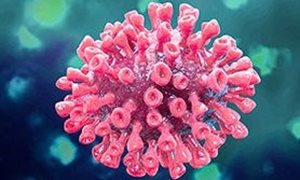22 May 2020
Malaria is a major infectious disease caused by a unicellular parasite. The parasite has a complicated life cycle with stages in humans and mosquitoes (see "About Malaria" below). The first stage in humans takes place in the liver, then infection of the blood follows with clinical symptoms and complications. Since the liver phase does not cause any symptoms, the purpose of the vaccine is to stop the parasite for safety in the liver. Parasites in the liver can already trigger a protective immune response.
An international consortium, in which Professor of Medical Parasitology Robert Sauerwein, theme Infectious diseases and global health, collaborated with Miguel Prudêncio of the Portuguese Instituto de Medicina Molecular and Perry van Genderen of Erasmus MC, has now completed a clinical trial. Prudêncio: “Following the pre-clinical validation of PbVac’s immunogenicity and safety for human use, we have carried out, with funding and advice from PATH’s Malaria Vaccine Initiative, a first-in-humans Phase 1/2a clinical trial, involving a total of 24 healthy volunteers, to ascertain PbVac’s safety and protective efficacy in the clinic.” Although none of the 24 subjects were fully protected, the infection with malaria parasites in the liver decreased by 95%.
Sauerwein concludes: “An effective vaccine is an essential part of a broad strategy in the fight against malaria. This approach shows that it works in principle, but that the composition of the vaccine or dose need to be adjusted.”
The most deadly form of malaria for humans is caused by the single-celled parasite Plasmodium falciparum, which is transmitted by mosquitoes to humans and vice versa. Once in humans, the parasite develops from an asexual cell into mature male and female germ cells in five stages. These cells can then be sucked up again by mosquitoes, after which fertilization of the parasites takes place in the mosquito stomach. The offspring can return to humans after another mosquito bite. Preventing the spread of malaria is considered to be one of the greatest challenges in the fight against the disease.

Malaria is a major infectious disease caused by a unicellular parasite. The parasite has a complicated life cycle with stages in humans and mosquitoes (see "About Malaria" below). The first stage in humans takes place in the liver, then infection of the blood follows with clinical symptoms and complications. Since the liver phase does not cause any symptoms, the purpose of the vaccine is to stop the parasite for safety in the liver. Parasites in the liver can already trigger a protective immune response.
Using a rodent malaria parasite
The vaccine in this study, called PbVac, belongs to a new class of whole-organism vaccines. It makes use of intact parasites, in this case a malaria parasite that is harmless to humans and can only infect mice (Plasmodium berghei). With genetic modification, an important protein of the human malaria parasite was added in order to evoke a protective immune response.An international consortium, in which Professor of Medical Parasitology Robert Sauerwein, theme Infectious diseases and global health, collaborated with Miguel Prudêncio of the Portuguese Instituto de Medicina Molecular and Perry van Genderen of Erasmus MC, has now completed a clinical trial. Prudêncio: “Following the pre-clinical validation of PbVac’s immunogenicity and safety for human use, we have carried out, with funding and advice from PATH’s Malaria Vaccine Initiative, a first-in-humans Phase 1/2a clinical trial, involving a total of 24 healthy volunteers, to ascertain PbVac’s safety and protective efficacy in the clinic.” Although none of the 24 subjects were fully protected, the infection with malaria parasites in the liver decreased by 95%.
Proof of principle
The results are a promising step towards an effective vaccine. Van Genderen: “The use of this smart transgenic Pberghei sporozoite immunization platform has substantially widened the potential for development of new vaccines in humans.”Sauerwein concludes: “An effective vaccine is an essential part of a broad strategy in the fight against malaria. This approach shows that it works in principle, but that the composition of the vaccine or dose need to be adjusted.”
About malaria
Malaria is one of the major infectious diseases of our time with around 216 million cases and 400,000 deaths annually. In recent years there has been an increase in the number of infections, especially in Sub-Saharan Africa and South America.The most deadly form of malaria for humans is caused by the single-celled parasite Plasmodium falciparum, which is transmitted by mosquitoes to humans and vice versa. Once in humans, the parasite develops from an asexual cell into mature male and female germ cells in five stages. These cells can then be sucked up again by mosquitoes, after which fertilization of the parasites takes place in the mosquito stomach. The offspring can return to humans after another mosquito bite. Preventing the spread of malaria is considered to be one of the greatest challenges in the fight against the disease.
Related news items

Rebecca Halbach receives idea generator grant to fight mosquito transmitted viruses
8 July 2020Rebecca Halbach and Pascal Miesen have investigated in a collaborative project whether the treatment of mosquitoes with antiviral drugs can prevent the transmission of mosquito-transmitted viral diseases.
go to page
Invasive fungal infections in influenza and COVID-19
8 July 2020 The Aspergillus fungus is found in the lungs of many COVID patients. A parallel occurs with influenza patients, who often develop a serious fungal infection. Although such a serious fungal infection seems to occur less frequently in COVID-patients, alertness remains necessary, go to page
First clinical trial with genetically modified malaria vaccine completed
22 May 2020 In an innovative study, Radboudumc and LUMC jointly tested a candidate vaccine based on a genetically weakened malaria parasite. The results of this clinical trial, published in Science Translational Medicine, show that the vaccine is safe and elicits a defense response against a malaria infection. go to page
Stuttering DNA orchestrates the start of the mosquito’s life
9 April 2020 A certain type of junk DNA that is found in mosquitoes and which repeats itself dozens of times, known as ‘satellite DNA’, has now been shown to play an essential role in the early development of mosquito embryos. Ronald van Rij and colleagues published their findings in Nature. go to page
NWO Open Competition Domain Science - XS grant for Ronald van Rij and Jenny van der Wijst
21 January 2020NWO Domain Science has awarded Ronald van Rij, theme Infectious diseases and global health and Jennny van der Wijst, theme Renal disorders an XS grant. The XS category emphatically strives to encourage curiosity-driven and bold research involving a relatively quick analysis of a promising idea.
go to page